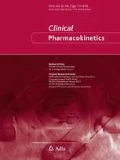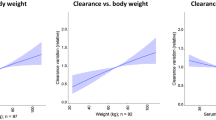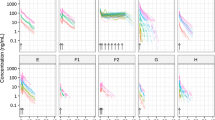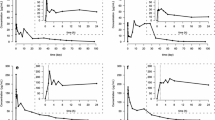Abstract
A growing number of population pharmacokinetic analyses of therapeutic monoclonal antibodies (mAbs) have been published in the scientific literature. The aims of this article are to summarize the findings from these studies and to relate the findings to the general pharmacokinetic and structural characteristics of therapeutic mAbs. A two-compartment model was used in the majority of the population analyses to describe the disposition of the mAb. Population estimates of the volumes of distribution in the central (V1) and peripheral (V2) compartments were typically small, with median (range) values of 3.1 (2.4–5.5) L and 2.8 (1.3–6.8) L, respectively. The estimated between-subject variability in the V1 was usually moderate, with a median (range) coefficient of variation (CV) of 26% (12–84%). Between-subject variability in other distribution-related parameters such as the V2 and intercompartmental clearance were often not estimated. Although the pharmacokinetic models used most frequently in the population analyses were models with linear clearance, other models with nonlinear, or parallel linear and nonlinear clearance pathways were also applied, as many therapeutic mAbs are eliminated via saturable target-mediated mechanisms. Population estimates of the maximum elimination rate (Vmax) and the mAb concentration at which elimination was at half maximum for Michaelis-Menten-type elimination pathways varied considerably among the different therapeutic mAbs. However, estimates of the total clearance (CL) of mAbs with linear clearance characteristics and of the clearance of mAbs via the linear clearance pathway (CLL) with parallel linear and nonlinear clearance were quite similar for the different mAbs and typically ranged from 0.2 to 0.5 L/day, which is relatively close to the estimated clearance of endogenous IgG of 0.21 L/day. The between-subject variability in the Vmax, CL and CLL was moderate to high, with estimated CVs ranging from 15% to 65%. Measures of body size were the covariates most commonly identified as influencing the pharmacokinetics of therapeutic mAbs.
In summary, many features of the population pharmacokinetics of currently used therapeutic mAbs are similar, despite differences in their pharmacological targets and studied patient populations.








Similar content being viewed by others
References
Maggon K. Monoclonal antibody “gold rush”. Curr Med Chem 2007; 14(18): 1978–87
Reichert JM. Monoclonal antibodies as innovative therapeutics. Curr Pharm Biotechnol 2008 Dec; 9(6): 423–30
Galluppi GR, Rogge MC, Roskos LK, et al. Integration of pharmacokinetic and pharmacodynamic studies in the discovery, development, and review of protein therapeutic agents: a conference report. Clin Pharmacol Ther 2001 Jun; 69(6): 387–99
Meibohm B. The role of pharmacokinetics and pharmacodynamics in the development of biotech drugs. In: Meibohm B, editor. Pharmacokinetics and pharmacodynamics of biotech drugs: principles and case studies in drug development. Weinheim: Wiley-VCH, 2006: 3–16
Meibohm B, Derendorf H. Pharmacokinetic/pharmacodynamic studies in drug product development. J Pharm Sci 2002 Jan; 91(1): 18–31
Kuester K, Kloft C. Pharmacokinetics of monoclonal antibodies. In: Meibohm B, editor. Pharmacokinetics and pharmacodynamics of biotech drugs: principles and case studies in drug development. Weinheim: Wiley-VCH, 2006: 45–92
Lobo ED, Hansen RJ, Balthasar JP. Antibody pharmacokinetics and pharmacodynamics. J Pharm Sci 2004 Nov; 93(11): 2645–68
Tabrizi MA, Tseng CM, Roskos LK. Elimination mechanisms of therapeutic monoclonal antibodies. Drug Discov Today 2006 Jan; 11(1–2): 81–8
Wang W, Wang EQ, Balthasar JP. Monoclonal antibody pharmacokinetics and pharmacodynamics. Clin Pharmacol Ther 2008 Nov; 84(5): 548–58
Roitt IM, Delves PJ, Martin SJ, et al. Roitt’s essential immunology. 11th ed. Malden (MA): Blackwell Publishing, 2006
Mascelli MA, Zhou H, Sweet R, et al. Molecular, biologic, and pharmacokinetic properties of monoclonal antibodies: impact of these parameters on early clinical development. J Clin Pharmacol 2007 May; 47(5): 553–65
Bonate PL. Recommended reading in population pharmacokinetic pharmacodynamics. AAPS J 2005; 7(2): E363–73
Bonate PL. Pharmacokinetic-pharmacodynamic modeling and simulation. Boston (MA): Springer Science+Business Media Inc., 2006
Ette EI, Williams PJ. Population pharmacokinetics I: background, concepts, and models. Ann Pharmacother 2004 Oct; 38(10): 1702–6
Ette EI, Williams PJ. Pharmacometrics: the science of quantitative pharmacology. Hoboken (NJ): John Wiley & Sons, 2007
Sheiner LB, Ludden TM. Population pharmacokinetics/dynamics. Annu Rev Pharmacol Toxicol 1992; 32: 185–209
Mould DR, Baumann A, Kuhlmann J, et al. Population pharmacokineticspharmacodynamics of alemtuzumab (Campath) in patients with chronic lymphocytic leukaemia and its link to treatment response. Br J Clin Pharmacol 2007 Sep; 64(3): 278–91
Peterson MC, Stouch BJ, Chen D, etal. A population PK/PD model describes the rapid, and sustained suppression of urinary N-telopeptide following administration of AMG 162, a fully human monoclonal antibody against RANKL, to healthy postmenopaual women. AAPS J 2004; 6 (S1) [online]. Available from URL: http://www.aaps.org/inside/focus_groups/poppk/imagespdfs/PopPKPD-2004Final.pdf [Accessed 2010 Jul 20]
Zingmark PH, Edenius C, Karlsson MO. Pharmacokinetic/pharmacody-namic models for the depletion of Vbeta5.2/5.3 T cells by the monoclonal antibody ATM-027 in patients with multiple sclerosis, as measured by FACS. Br J Clin Pharmacol 2004 Oct; 58(4): 378–89
Mentre F, Kovarik J, Gerbeau C. Constructing a prediction interval for time to reach a threshold concentration based on a population pharmacokinetic analysis: an application to basiliximab in renal transplantation. J Pharmacokinet Biopharm 1999 Apr; 27(2): 213–30
Kovarik JM, Nashan B, Neuhaus P, et al. A population pharmacokinetic screen to identify demographic-clinical covariates of basiliximab in liver transplantation. Clin Pharmacol Ther 2001 Apr; 69(4): 201–9
Lu JF, Bruno R, Eppler S, et al. Clinical pharmacokinetics of bevacizumab in patients with solid tumors. Cancer Chemother Pharmacol 2008 Oct; 62(5): 779–86
Dirks NL, Nolting A, Kovar A, et al. Population pharmacokinetics of cetuximab in patients with squamous cell carcinoma of the head and neck. J Clin Pharmacol 2008 Mar; 48(3): 267–78
Mould DR, Davis CB, Minthorn EA, et al. A population pharmacokineticpharmacodynamic analysis of single doses of clenoliximab in patients with rheumatoid arthritis. Clin Pharmacol Ther 1999 Sep; 66(3): 246–57
Yin D, Paccagnella ML, Lacy MQ, et al. Population pharmacokinetics of CP-751, 871, a monoclonal antibody against IGF-I receptor, in patients with multiple myeloma or solid tumors [abstract no. 2524]. J Clin Oncol 2008 May 20; 26 (15 Suppl.) [online]. Available from URL: http://www.asco.org/ASCOv2/MultiMedia/Virtual+Meeting?vmview=vm_session_presentations_view&confID=55&sessionID=385 [Accessed 2010 Jul 20]
Peterson MC, Jang G, Kim W, et al. Selection of a phase 3 dose regimen for denosumab based on pharmacokinetic (PK), pharmacodynamic (PD), and safety data from multiple subcutaneous (SC) dosing regimens in breast cancer patients (pts) with bone metastases (BM) [abstract no. 3086]. J Clin Oncol 2006 Jun 20; 24 (18 Suppl.) [online]. Available from URL: http://www.asco.org/ASCOv2/MultiMedia/Virtual+Meeting?vmview=vm_session_presentations_view&confID=40&sessionID=395 [Accessed 2010 Jul 20]
Ng CM, Joshi A, Dedrick RL, et al. Pharmacokinetic-pharmacodynamic-efficacy analysis of efalizumab in patients with moderate to severe psoriasis. Pharm Res 2005 Jul; 22(7): 1088–100
Sun YN, Lu JF, Joshi A, et al. Population pharmacokinetics of efalizumab (humanized monoclonal anti-CD11a antibody) following long-term subcutaneous weekly dosing in psoriasis subjects. J Clin Pharmacol 2005 Apr; 45(4): 468–76
Zhou H, Jang H, Fleischmann RM, et al. Pharmacokinetics and safety of golimumab, a fully human anti-TNF-alpha monoclonal antibody, in subjects with rheumatoid arthritis. J Clin Pharmacol 2007 Mar; 47(3): 383–96
Bauer RJ, Dedrick RL, White ML, et al. Population pharmacokinetics and pharmacodynamics of the anti-CD11a antibody hu1124 in human subjects with psoriasis. J Pharmacokinet Biopharm 1999 Aug; 27(4): 397–420
Fang L, Holford NH, Hinkle G, et al. Population pharmacokinetics of humanized monoclonal antibody HuCC49deltaCH2 and murine antibody CC49 in colorectal cancer patients. J Clin Pharmacol 2007 Feb; 47(2): 227–37
Xu Z, Seitz K, Fasanmade A, et al. Population pharmacokinetics of in-fliximab in patients with ankylosing spondylitis. J Clin Pharmacol 2008 Jun; 48(6): 681–95
Fasanmade AA, Adedokun OJ, Ford J, et al. Population pharmacokinetic analysis of infliximab in patients with ulcerative colitis. Eur J Clin Pharmacol 2009; 65(12): 1211–28
Dartois C, Freyer G, Michallet M, et al. Exposure-effect population model of inolimomab, a monoclonal antibody administered in first-line treatment for acute graft-versus-host disease. Clin Pharmacokinet 2007; 46(5): 417–32
Tanswell P, Garin-Chesa P, Rettig WJ, et al. Population pharmacokinetics of antifibroblast activation protein monoclonal antibody F19 in cancer patients. Br J Clin Pharmacol 2001 Feb; 51(2): 177–80
Kuester K, Kovar A, Lupfert C, et al. Population pharmacokinetic data analysis of three phase I studies of matuzumab, a humanised anti-EGFR monoclonal antibody in clinical cancer development. Br J Cancer 2008 Mar 11; 98(5): 900–6
Hayashi N, Tsukamoto Y, Sallas WM, et al. A mechanism-based binding model for the population pharmacokinetics and pharmacodynamics of omalizumab. Br J Clin Pharmacol 2007 May; 63(5): 548–61
Ma P, Yang BB, Wang YM, et al. Population pharmacokinetic analysis of panitumumab in patients with advanced solid tumors. J Clin Pharmacol 2009 Oct; 49(10): 1142–56
Ng CM, Lum BL, Gimenez V, et al. Rationale for fixed dosing of pertuzumab in cancer patients based on population pharmacokinetic analysis. Pharm Res 2006 Jun; 23(6): 1275–84
Ng CM, Bruno R, Combs D, et al. Population pharmacokinetics of rituximab (anti-CD20 monoclonal antibody) in rheumatoid arthritis patients during a phase II clinical trial. J Clin Pharmacol 2005 Jul; 45(7): 792–801
Kloft C, Graefe EU, Tanswell P, et al. Population pharmacokinetics of sibrotuzumab, a novel therapeutic monoclonal antibody, in cancer patients. Invest New Drugs 2004 Jan; 22(1): 39–52
Bruno R, Washington CB, Lu JF, et al. Population pharmacokinetics of trastuzumab in patients with HER2+ metastatic breast cancer. Cancer Chemother Pharmacol 2005 Oct; 56(4): 361–9
Zhu Y, Hu C, Lu M, et al. Population pharmacokinetic modeling of ustekinumab, a human monoclonal antibody targeting IL-12/23p40, in patients with moderate to severe plaque psoriasis. J Clin Pharmacol 2009 Feb; 49(2): 162–75
Pescovitz MD, Knechtle S, Alexander SR, et al. Safety and pharmacokinetics of daclizumab in pediatric renal transplant recipients. Pediatr Transplant 2008 Jun; 12(4): 447–55
Meissner HC, Groothuis JR, Rodriguez WJ, et al. Safety and pharmacokinetics of an intramuscular monoclonal antibody (SB 209763) against respiratory syncytial virus (RSV) ininfants and young children atrisk for severe RSV disease. Antimicrob Agents Chemother 1999 May; 43(5): 1183–8
Beal SL, Sheiner LB, Boeckmann AJ, editors. NONMEM users guides. Ellicott City (MD): Icon Development Solutions, 2006
Ternant D, Aubourg A, Magdelaine-Beuzelin C, et al. Infliximab pharmacokinetics in inflammatory bowel disease patients. Ther Drug Monit 2008 Aug; 30(4): 523–9
Supersaxo A, Hein WR, Steffen H. Effect of molecular weight on the lymphatic absorption of water-soluble compounds following subcutaneous administration. Pharm Res 1990 Feb; 7(2): 167–9
McLennan DN, Porter CJ, Edwards GA, et al. Lymphatic absorption is the primary contributor to the systemic availability of epoetin alfa following subcutaneous administration to sheep. J Pharmacol Exp Ther 2005 Apr; 313(1): 345–51
Kagan L, Gershkovich P, Mendelman A, et al. The role of the lymphatic system in subcutaneous absorption of macromolecules in the rat model. Eur J Pharm Biopharm 2007 Nov; 67(3): 759–65
O’Driscoll CM. Anatomy and physiology of the lymphatics. In: Charman WN, Stella VJ, editors. Lymphatic transport of drugs. Boca Raton (FL): CRC Press, 1992: 1–36
Garg A, Balthasar JP. Physiologically-based pharmacokinetic (PBPK) model to predict IgG tissue kinetics in wild-type and FcRn-knockout mice. J Pharmacokinet Pharmacodyn 2007 Oct; 34(5): 687–709
Tabrizi M, Bornstein GG, Suria H. Biodistribution mechanisms of therapeutic monoclonal antibodies in health and disease. AAPS J 2010 Mar; 12(1): 33–43
Ghetie V, Ward ES. FcRn: the MHC class I-related receptor that is more than an IgG transporter. Immunol Today 1997 Dec; 18(12): 592–8
Ward ES, Zhou J, Ghetie V, et al. Evidence to support the cellular mechanism involved in serum IgG homeostasis in humans. Int Immunol 2003 Feb; 15(2): 187–95
Antohe F, Radulescu L, Gafencu A, et al. Expression of functionally active FcRn and the differentiated bidirectional transport of IgG in human placental endothelial cells. Hum Immunol 2001 Feb; 62(2): 93–105
Claypool SM, Dickinson BL, Yoshida M, et al. Functional reconstitution of human FcRn in Madin-Darby canine kidney cells requires co-expressed human beta 2-microglobulin. J Biol Chem 2002 Aug 2; 277(31): 28038–50
Dickinson BL, Badizadegan K, Wu Z, et al. Bidirectional FcRn-dependent IgG transport in a polarized human intestinal epithelial cell line. J Clin Invest 1999 Oct; 104(7): 903–11
Kobayashi N, Suzuki Y, Tsuge T, et al. FcRn-mediated transcytosis of immunoglobulin G in human renal proximal tubular epithelial cells. Am J Physiol Renal Physiol 2002 Feb; 282(2): F358–65
McCarthy KM, Yoong Y, Simister NE. Bidirectional transcytosis of IgG by the rat neonatal Fc receptor expressed in a rat kidney cell line: a system to study protein transport across epithelia. J Cell Sci 2000 Apr; 113(Pt 7): 1277–85
Praetor A, Ellinger I, Hunziker W. Intracellular traffic ofthe MHC class I-like IgG Fc receptor, FcRn, expressed in epithelial MDCK cells. J Cell Sci 1999 Jul; 112(Pt 14): 2291–9
Tuma PL, Hubbard AL. Transcytosis: crossing cellular barriers. Physiol Rev 2003 Jul; 83(3): 871–932
Tang L, Persky AM, Hochhaus G, et al. Pharmacokinetic aspects of biotechnology products. J Pharm Sci 2004 Sep; 93(9): 2184–204
Waldmann TA, Strober W. Metabolism of immunoglobulins. Prog Allergy 1969; 13: 1–110
Straughn AB. Limitations of noncompartmental pharmacokinetic analysis of biotech drugs. In: Meibohm B, editor. Pharmacokinetics and pharmacodynamics of biotech drugs: principles and case studies in drug development. Weinheim: Wiley-VCH, 2006: 181–8
Lote CJ. Principles of renal physiology. 4th ed. Boston (MA): Kluwer Academic Publishers, 2000
Wu CT, Davis PA, Luketic VA, et al. A review of the physiological and immunological functions of biliary epithelial cells: targets for primary biliary cirrhosis, primary sclerosing cholangitis and drug-induced ductopenias. Clin Dev Immunol 2004 Sep-Dec; 11(3-4): 205–13
Brambell FW. The transmission of immunity from mother to young and the catabolism of immunoglobulins. Lancet 1966 Nov 19; 2(7473): 1087–93
Junghans RP. Finally! The Brambell receptor (FcRB). Mediator of transmission of immunity and protection from catabolism for IgG. Immunol Res 1997 Feb; 16(1): 29–57
Ober RJ, Martinez C, Vaccaro C, et al. Visualizing the site and dynamics of IgG salvageby the MHC class I-related receptor, FcRn. J Immunol 2004 Feb 15; 172(4): 2021–9
Morell A, Terry WD, Waldmann TA. Metabolic properties of IgG subclasses in man. J Clin Invest 1970 Apr; 49(4): 673–80
Kim J, Hayton WL, Robinson JM, et al. Kinetics of FcRn-mediated recycling of IgG and albumin in human: pathophysiology and therapeutic implications using a simplified mechanism-based model. Clin Immunol 2007 Feb; 122(2): 146–55
Daba MB. FcRn expresion, ligands binding properties and its regulation in human immune cells and hepatocytes [thesis]. Oslo: University of Oslo, 2007
Roopenian DC, Akilesh S. FcRn: the neonatal Fc receptor comes of age. Nat Rev Immunol 2007 Sep; 7(9): 715–25
Sigal LH. Basic science for the clinician 47: Fcgamma receptors [published erratum appears in J Clin Rheumatol 2008 Feb;14 (1): 60]. J Clin Rheumatol 2007 Dec; 13(6): 355–8
Levy G. Pharmacologic target-mediated drug disposition. Clin Pharmacol Ther 1994 Sep; 56(3): 248–52
Mager DE. Target-mediated drug disposition and dynamics. Biochem Pharmacol 2006 Jun 28; 72(1): 1–10
Marathe A, Peterson MC, Mager DE. Integrated cellular bone homeostasis model for denosumab pharmacodynamics in multiple myeloma patients. J Pharmacol Exp Ther 2008 Aug; 326(2): 555–62
Tabrizi MA, Roskos LK. Exposure-response relationships for therapeutic biologic products. In: Meibohm B, editor. Pharmacokinetics and pharmacodynamics of biotech drugs: principles and case studies in drug development. Weinheim: Wiley-VCH, 2006: 295–330
Tan AR, Moore DF, Hidalgo M, et al. Pharmacokinetics of cetuximab after administration ofescalating single dosing and weekly fixed dosing in patients with solid tumors. Clin Cancer Res 2006 Nov 1; 12(21): 6517–22
Baselga J, Pfister D, Cooper MR, et al. Phase I studies of anti-epidermal growth factor receptor chimeric antibody C225 alone and in combination with cisplatin. J Clin Oncol 2000 Feb; 18(4): 904–14
Tokuda Y, Watanabe T, Omuro Y, et al. Dose escalation and pharmacokinetic study of a humanized anti-HER2 monoclonal antibody in patients with HER2/neu-overexpressing metastatic breast cancer. Br J Cancer 1999 Dec; 81(8): 1419–25
Godfrey KR, Chapman MJ, Vajda S. Identifiability and indistinguishability of nonlinear pharmacokinetic models. J Pharmacokinet Biopharm 1994 Jun; 22(3): 229–51
Gibiansky L, Gibiansky E. Target-mediated drug disposition model: approximations, identifiability of model parameters and applications to the population pharmacokinetic-pharmacodynamic modeling of biologics. Expert Opin Drug Metab Toxicol 2009 Jul; 5(7): 803–12
Gibiansky L, Gibiansky E, Kakkar T, et al. Approximations of the targetmediated drug disposition model and identifiability of model parameters. J Pharmacokinet Pharmacodyn 2008 Oct; 35(5): 573–91
Khosla S. Minireview: the OPG/RANKL/RANK system. Endocrinology 2001 Dec; 142(12): 5050–5
Lewiecki EM. Denosumab: an investigational drug for the management of postmenopausal osteoporosis. Biologics 2008 Dec; 2(4): 645–53
Cohenuram M, Saif MW. Panitumumab the first fully human monoclonal antibody: from the bench to the clinic. Anticancer Drugs 2007 Jan; 18(1): 7–15
Kim GP, Grothey A. Targeting colorectal cancer with human anti-EGFR monoclonocal antibodies: focus on panitumumab. Biologics 2008 Jun; 2(2): 223–8
Vanhoefer U, Tewes M, Rojo F, et al. Phase I study of the humanized antiepidermal growth factor receptor monoclonal antibody EMD72000 in patients with advanced solid tumors that express the epidermal growth factor receptor. J Clin Oncol 2004 Jan 1; 22(1): 175–84
Ober RJ, Radu CG, Ghetie V, et al. Differences in promiscuity for antibody-FcRn interactions across species: implications for therapeutic antibodies. Int Immunol 2001 Dec; 13(12): 1551–9
Kovarik J, Breidenbach T, Gerbeau C, et al. Disposition and immunodynamics of basiliximab in liver allograft recipients. Clin Pharmacol Ther 1998 Jul; 64(1): 66–72
Cartron G, Dacheux L, Salles G, et al. Therapeutic activityofhumanized antiCD20 monoclonal antibody and polymorphism in IgG Fc receptor FcgammaRIIIa gene. Blood 2002 Feb 1; 99(3): 754–8
Weng WK, Levy R. Two immunoglobulin G fragment C receptor polymorphisms independently predict response to rituximab in patients with follicular lymphoma. J Clin Oncol 2003 Nov 1; 21(21): 3940–7
Louis E, El Ghoul Z, Vermeire S, et al. Association between polymorphism in IgG Fc receptor IIIa coding gene and biological response to infliximab in Crohn’s disease. Aliment Pharmacol Ther 2004 Mar 1; 19(5): 511–9
Musolino A, Naldi N, Bortesi B, et al. Immunoglobulin G fragment C receptor polymorphisms and clinical efficacy of trastuzumab-based therapy in patients with HER-2/neu-positive metastatic breast cancer. J Clin Oncol 2008 Apr 10; 26(11): 1789–96
Meibohm B, Laer S, Panetta JC, et al. Population pharmacokinetic studies in pediatrics: issues in design and analysis. AAPS J 2005; 7(2): E475–87
Wang DD, Zhang S, Zhao H, et al. Fixed dosing versus body size-based dosing of monoclonal antibodies in adult clinical trials. J Clin Pharmacol 2009 Sep; 49(9): 1012–24
Avastin® (bevacizumab): US prescribing information. South San Francisco (CA): Genentech, Inc., 2009 Jul [online]. Available from URL: http://www.gene.com/gene/products/information/pdf/avastin-prescribing.pdf [Accessed 2010 Jul 20]
Rituxan® (rituximab): US prescribing information. South San Francisco (CA): Genentech, 2010 Feb [online]. Available from URL: http://www.gene.com/gene/products/information/pdf/rituxan-prescribing.pdf [Accessed 2010 Jul 20]
Levi M, Li J, Frey N, et al. Characterization of the time-varying clearance of rituximab in non-Hodgkin’s lymphoma patients using a population pharmacokinetic analysis [abstract no. 9]. American Conference on Pharmacometrics; 2008 Mar 9–12; Tucson (AZ) [online]. Available from URL: http://tucson2008.go-acop.org/pdfs/Levi.pdf [Accessed 2010 Jul 20]
Seitz K, Zhou H. Pharmacokinetic drug-drug interaction potentials for therapeutic monoclonal antibodies: reality check. J Clin Pharmacol 2007 Sep; 47(9): 1104–18
de Bono JS, Tolcher AW, Forero A, et al. ING-1, a monoclonal antibody targeting Ep-CAM in patients with advanced adenocarcinomas. Clin Cancer Res 2004 Nov 15; 10(22): 7555–65
Roskos LK, Kellermann SA, Foon KA. Human antiglobulin responses. In: Lotze MT, Thomson AW, editors. Measuring immunity: basic science and clinical practice. San Diego (CA): Elsevier Academic Press, 2005: 172–86
Mahmood I, Green MD. Pharmacokinetic and pharmacodynamic considerations in the development of therapeutic proteins. Clin Pharmacokinet 2005; 44(4): 331–47
Anderson CL, Chaudhury C, Kim J, et al. Perspective: FcRn transports albumin: relevance to immunology and medicine. Trends Immunol 2006 Jul; 27(7): 343–8
Acknowledgements
Dr Nathanael L. Dirks was partially supported by a fellowship from the American Foundation for Pharmaceutical Education (Rockville, MD, USA). No other source of funding was used to prepare this review. The authors have no conflicts of interest that are directly relevant to the content of this review.
Author information
Authors and Affiliations
Corresponding author
Rights and permissions
About this article
Cite this article
Dirks, N.L., Meibohm, B. Population Pharmacokinetics of Therapeutic Monoclonal Antibodies. Clin Pharmacokinet 49, 633–659 (2010). https://doi.org/10.2165/11535960-000000000-00000
Published:
Issue Date:
DOI: https://doi.org/10.2165/11535960-000000000-00000




